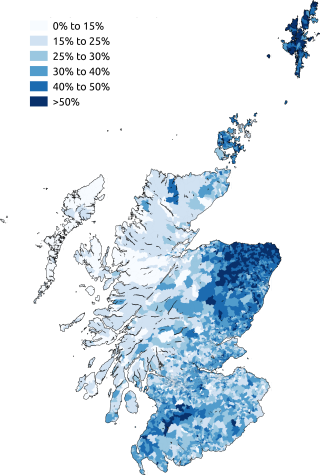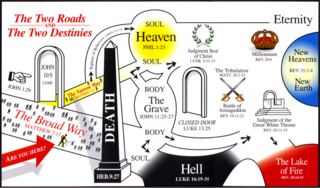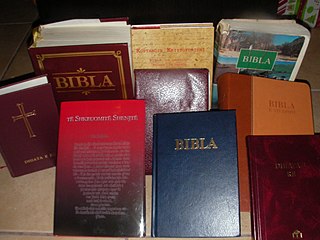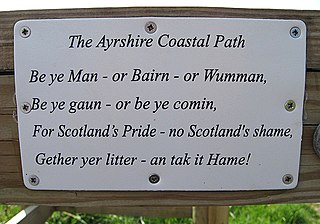
Doric, the popular name for Mid Northern Scots or Northeast Scots, refers to the Scots language as spoken in the northeast of Scotland. There is an extensive body of literature, mostly poetry, ballads, and songs, written in Doric. In some literary works, Doric is used as the language of conversation while the rest of the work is in Lallans Scots or British English. A number of 20th and 21st century poets have written poetry in the Doric dialect.

Scots is an Anglic language variety in the West Germanic language family, spoken in Scotland and parts of Ulster in the north of Ireland. Most commonly spoken in the Scottish Lowlands, Northern Isles, and northern Ulster, it is sometimes called Lowland Scots to distinguish it from Scottish Gaelic, the Goidelic Celtic language that was historically restricted to most of the Scottish Highlands, the Hebrides, and Galloway after the sixteenth century; or Broad Scots to distinguish it from Scottish Standard English. Modern Scots is a sister language of Modern English, as the two diverged independently from the same source: Early Middle English (1100–1300).

Ulster Scots or Ulster-Scots, also known as Ulster Scotch and Ullans, is the dialect of Scots spoken in parts of Ulster in Northern Ireland and the Republic of Ireland. It is generally considered a dialect or group of dialects of Scots, although groups such as the Ulster-Scots Language Society and Ulster-Scots Academy consider it a language in its own right, and the Ulster-Scots Agency and former Department of Culture, Arts and Leisure have used the term Ulster-Scots language.
The Glasgow dialect, also called Glaswegian, varies from Scottish English at one end of a bipolar linguistic continuum to the local dialect of West Central Scots at the other. Therefore, the speech of many Glaswegians can draw on a "continuum between fully localised and fully standardised". Additionally, the Glasgow dialect has Highland English and Hiberno-English influences owing to the speech of Highlanders and Irish people who migrated in large numbers to the Glasgow area in the 19th and early 20th centuries. While being named for Glasgow, the accent is typical for natives across the full Greater Glasgow area and associated counties such as Lanarkshire, Renfrewshire, Dunbartonshire and parts of Ayrshire, which formerly came under the single authority of Strathclyde. It is most common in working class people, which can lead to stigma from members of other classes or those outside Glasgow.
William Barclay CBE was a Scottish author, radio and television presenter, Church of Scotland minister, and Professor of Divinity and Biblical Criticism at the University of Glasgow. He wrote a popular set of Bible commentaries on the New Testament that sold 1.5 million copies.
Partial Bible translations into languages of the English people can be traced back to the late 7th century, including translations into Old and Middle English. More than 100 complete translations into English have been produced. A number of translations have been prepared of parts of the Bible, some deliberately limited to certain books and some projects that have been abandoned before the planned completion.

The Peshitta is the standard version of the Bible for churches in the Syriac tradition, including the Maronite Church, the Chaldean Catholic Church, the Syriac Catholic Church, the Syriac Orthodox Church, the Malankara Orthodox Syrian Church, the Malabar Independent Syrian Church, the Syro-Malankara Catholic Church, the Assyrian Church of the East and the Syro-Malabar Church.
James Moffatt was a Scottish theologian and graduate of the University of Glasgow.
Scottish Bible Society (SBS), founded in 1809 as the Edinburgh Bible Society, amalgamated in 1861 with the Glasgow Bible Society to form the National Bible Society of Scotland, is a Scottish Christian charity that exists to make the Bible available throughout the world.

The Gospel Halls are a group of independent Christian assemblies throughout the world that fellowship with each other through a set of shared Biblical doctrines and practices. Theologically, they are evangelical and dispensational. They are a conservative strand of the Open Brethren movement and tend to only collaborate with other assemblies when there is doctrinal agreement.

Syriac is a dialect of Aramaic. Portions of the Old Testament were written in Aramaic and there are Aramaic phrases in the New Testament. Syriac translations of the New Testament were among the first and date from the 2nd century. The whole Bible was translated by the 5th century. Besides Syriac, there are Bible translations into other Aramaic dialects.

The history of Bible translations into Albanian can be divided into early and modern translations.

Modern Scots comprises the varieties of Scots traditionally spoken in Lowland Scotland and parts of Ulster, from 1700.
Part of the Bible was first available in the Kurdish language in 1856. Modern translations of the whole Bible are available in standard Kurmanji and Sorani, with many portions in other dialects.
Biblical translations into the indigenous languages of North and South America have been produced since the 16th century.
The Bible has been completely translated into Lowland Scots, with parts also translated. In 1513-39 Murdoch Nisbet, associated with a group of Lollards, wrote a Scots translation of the New Testament, working from John Purvey's Wycliffite Bible. However, this work remained unpublished, in manuscript form, and was known only to his family and Bible scholars. It was published by the Scottish Text Society in 1901–5. The first direct translation of a book of the Bible from one of the original languages, rather than a pre-existing English model was Peter Hately Waddell's The Psalms: frae Hebrew intil Scottis, published in 1871.
The New Testament was first published in Scottish Gaelic in 1767 and the whole Bible was first published in 1801. Prior to these, Gaels in Scotland had used translations into Irish.
The history of all Bible translations into Slavic languages begins with Bible translations into Church Slavonic. Other languages include:
Iain Donald Campbell was a minister and former Moderator in the Free Church of Scotland. He was a prolific author on a range of Biblical topics and church history. Campbell died in January 2017, and it subsequently emerged that he killed himself due to revelations surrounding Campbell having multiple extra-marital affairs with members of his congregation.








